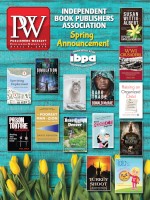Marais’s second novel, If You Want to Make God Laugh (Putnam, July), focuses on the struggles of three women whose lives connect in surprising ways in newly postapartheid South Africa.
You’re from South Africa. What was your childhood like?
I was born in Johannesburg in 1976. I grew up surrounded by Afrikaners and had a very insular upbringing. My family had a black woman named Eunice work for us as a maid. In South Africa at this time it was common for black women to have to leave their own children behind in their homelands and come to Johannesburg to find employment and raise white people’s children. Through my relationship with Eunice, my eyes were opened to the atrocities of apartheid. For me, it was my love for Eunice and Eunice’s love of me that helped me reject the apartheid racism and brainwashing. It was my relationship with Eunice that inspired me to write my first novel and has guided my philosophy on race throughout my life.
The Afrikaner characters Ruth and Delilah struggle with their own perceptions of racism and race. Is that something that also comes from your own experience?
I see Delilah as someone like me who’s tried hard her whole life to unlearn her inherent biases. That sort of thinking was particularly important for me to explore because I have had to tackle that implicit racism in myself. I have to stop and say, “What is this thinking, where is it coming from, and how can I change my thinking?”
You did research on Zulu culture and language to write the character of Zodwa. What kind of preparation was necessary to write from a different racial and cultural perspective?
I had to immediately say, “I know nothing about what it is to be a black woman in South Africa.” I had spent a lot of time with black women; I’ve spoken with many black women. But speaking to black women and hearing their stories is not the same as living their lives. So, I approached the character of Zodwa with humility, respect, and empathy. It was also extremely important as a white writer writing from a person of color’s perspective to consult the community and hire sensitivity readers and cultural experts and ask them, “Could you look at this work? Could you tell me where I’m going wrong?” And that was so, so important.
What’s next for you?
What I’m working on now is a psychological thriller, and I’m having quite a bit of fun with it: there’s murder, mayhem, sex, and it’s a completely different approach and a lot of fun. I think there are other literary models that I’d like to explore as well while getting away from the South African themes.



 Volume 266
Issue 14
04/08/2019
Volume 266
Issue 14
04/08/2019





